

A Few Things You Really Need To Know As An Anxious Writer And/Or Artist. I see a lot of people fall into a very toxic trap - they spend so long polishing and refining their work that it never, ever gets published or put up anywhere.
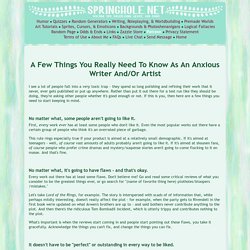
Rather than put it out there for a test run like they should be doing, they're asking other people whether it's good enough or not. 25 Things Writers Should Stop Doing. I read this cool article last week — “30 Things To Stop Doing To Yourself” — and I thought, hey, heeeey, that’s interesting.

Writers might could use their own version of that. So, I started to cobble one together. And, of course, as most of these writing-related posts become, it ended up that for the most part I’m sitting here in the blog yelling at myself first and foremost. That is, then, how you should read this: me, yelling at me. If you take away something from it, though? Then go forth and kick your writing year in the teeth. Onto the list. 1.
How to Get Rid of Writer's Block. How to Stop Procrastinating and Start Writing. Procrastination has to be one of the top enemies of productivity. Steven Pressfield, author of “War of Art” would call it one form of resistance. Today, author and blogger Ali Luke from Aliventures provides some strategies. My personal tools include Write Or Die for first draft writing and diarizing like a crazy person, blocking chunks out for each part of my life. Start Your Novel Already! I’ve been getting a lot of questions regarding people having apprehensions about beginning their novel.
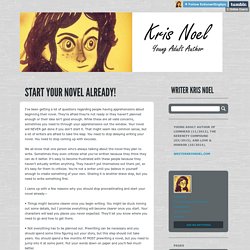
They’re afraid they’re not ready or they haven’t planned enough or their idea isn’t good enough. While these are all valid concerns, sometimes you need to through your apprehensions out the window. Your novel will NEVER get done if you don’t start it. That might seem like common sense, but a lot of writers are afraid to take the leap. 5 Successful Authors On How They Overcame Creative Blocks To Write Their First Book. The best books seem to have an effortlessness to their writing, as though each word has been set down just where it needs to be.

Nowhere on the page is the agonizing, writing, rewriting, not writing of getting it done visible. "Writing a long novel is like survival training," Haruki Murakami has said. "Physical strength is as necessary as artistic sensitivity. " And rarely does it come out right the first time around. Ernest Hemingway rewrote the last page of Farewell to Arms thirty-nine times before he was satisfied with it. All too often, there comes a point in a creative project when your progress seems to hit a wall—when the idea of ever finishing feels nearly impossible. I spoke with five writers who recently finished their first book about how they dealt with such moments in their own work and what they did to overcome these creative blocks. "Creating a community reminded me why we write. " "You do the work when you're not in front of it. " "Enter your story in a different way. " The Struggling Writer. I have a condition, a condition so stupid I’m afraid to even mention it.
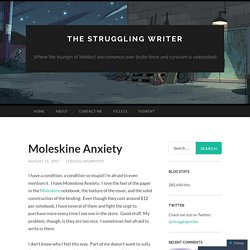
I have Moleskine Anxiety. I love the feel of the paper in the Moleskine notebook, the texture of the cover, and the solid construction of the binding. Even though they cost around $12 per notebook, I have several of them and fight the urge to purchase more every time I see one in the store. How to Shut Up Your Inner EditorWritersDigest.com. It can strike while you’re working on any piece, anytime, anywhere.

Why Writers Are the Worst Procrastinators. Like most writers, I am an inveterate procrastinator.
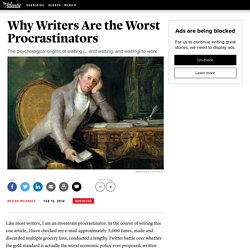
In the course of writing this one article, I have checked my e-mail approximately 3,000 times, made and discarded multiple grocery lists, conducted a lengthy Twitter battle over whether the gold standard is actually the worst economic policy ever proposed, written Facebook messages to schoolmates I haven’t seen in at least a decade, invented a delicious new recipe for chocolate berry protein smoothies, and googled my own name several times to make sure that I have at least once written something that someone would actually want to read. Lots of people procrastinate, of course, but for writers it is a peculiarly common occupational hazard.
One book editor I talked to fondly reminisced about the first book she was assigned to work on, back in the late 1990s. It had gone under contract in 1972. I once asked a talented and fairly famous colleague how he managed to regularly produce such highly regarded 8,000 word features. “Exactly!” How To Get Back Into Writing (Once You’ve Lost Your Groove) I’m not sure how it happened.
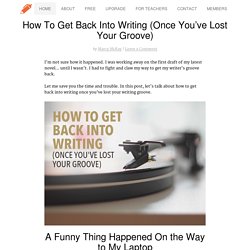
I was working away on the first draft of my latest novel… until I wasn’t. I had to fight and claw my way to get my writer’s groove back. Let me save you the time and trouble.